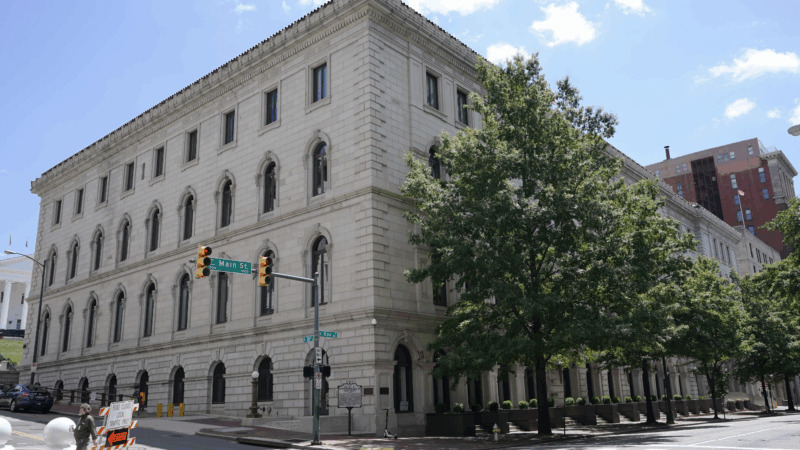Justice Department says Trump can cancel national monuments that protect landscapes
BILLINGS, Mont. — Lawyers for President Donald Trump’s administration say he has the authority to abolish national monuments meant to protect historical and archaeological sites across broad landscapes, including two in California created by his predecessor at the request of Native American tribes.
A Justice Department legal opinion released Tuesday disavowed a 1938 determination that monuments created by previous presidents under the Antiquities Act can’t be revoked. The department said presidents can cancel monument designations if protections aren’t warranted.
The finding comes as the Interior Department under Trump weighs changes to monuments across the nation as part of the administration’s push to expand U.S. energy production.
Sen. Martin Heinrich of New Mexico, the ranking Democrat on the Senate Natural Resources Committee, said that at Trump’s order, “his Justice Department is attempting to clear a path to erase national monuments.”
Trump in his first term reduced the size of Bears Ears and Grand Staircase Escalante National Monuments in Utah, calling them a “massive land grab.” He also lifted fishing restrictions within a sprawling marine monument off the New England Coast.
Former President Joe Biden reversed the moves and restored the monuments.
The two monuments singled out in the newly released Justice Department opinion were designated by Biden in his final days in office: Chuckwalla National Monument, in Southern California near Joshua Tree National Park, and Sáttítla Highlands National Monument, in Northern California.
The Democrat’s declarations for the monuments barred oil and natural gas drilling and mining on the 624,000-acre Chuckwalla site, and the roughly 225,000 acres Sáttítla Highlands site near the California-Oregon border.
Chuckwalla has natural wonders including the Painted Canyon of Mecca Hills and Alligator Rock, and is home to rare species of plants and animals like the desert bighorn sheep and the Chuckwalla lizard. The Sáttítla Highlands include the ancestral homelands of the Pit River Tribe and Modoc Peoples.
All but three presidents have used the 1906 Antiquities Act to protect unique landscapes and cultural resources. About half the national parks in the U.S. were first designated as monuments.
But critics of monument designations under Biden and Obama say the protective boundaries were stretched too far, hindering mining for critical minerals.
Deputy Assistant Attorney General Lanora Pettit wrote in the Trump administration opinion that Biden’s protections of Chuckwalla and the Sattítla Highlands were part of the Democrat’s attempts to create for himself an environmental legacy that includes more places to hike, bike, camp or hunt.
“Such activities are entirely expected in a park, but they are wholly unrelated to (if not outright incompatible with) the protection of scientific or historical monuments,” Pettit wrote.
Trump in April lifted commercial fishing prohibitions within an expansive marine monument in the Pacific Ocean created under former President Barack Obama.
Environmental groups said Tuesday’s Justice Department opinion doesn’t give him the authority to shrink monuments at will.
“Americans overwhelmingly support our public lands and oppose seeing them dismantled or destroyed,” said Axie Navas with The Wilderness Society.
Biden established 10 new monuments, among them the site of a 1908 race riot in Springfield, Illinois, and another on a sacred Native American site near the Grand Canyon.
Since 1912, presidents have issued more than a dozen proclamations that diminished monuments, according to a National Park Service database.
Dwight Eisenhower was most active in undoing the proclamations of his predecessors as he diminished six monuments, including Arches in Utah, Great Sand Dunes in Colorado and Glacier Bay in Alaska, which have all since become national parks.
Trump’s moves to shrink the Utah monuments in his first term were challenged by environmental groups that said protections for the sites safeguard water supplies and wildlife while preserving cultural sites.
The reductions were reversed by Biden before the case was resolved, and it remains pending.
President Theodore Roosevelt signed the Antiquities Act after lobbying by educators and scientists who wanted to protect sites from artifact looting and haphazard collecting by individuals. It was the first law in the U.S. to establish legal protections for cultural and natural resources of historic or scientific interest on federal lands.
Federal judge acknowledges ‘abusive workplace’ in court order
The order did not identify the judge in question but two sources familiar with the process told NPR it is U.S. District Judge Lydia Kay Griggsby, a Biden appointee.
Top 5 takeaways from the House immigration oversight hearing
The hearing underscored how deeply divided Republicans and Democrats remain on top-level changes to immigration enforcement in the wake of the shootings of two U.S. citizens.
Snowboarder Chloe Kim is chasing an Olympic gold three-peat with a torn labrum
At 25, Chloe Kim could become the first halfpipe snowboarder to win three consecutive Olympic golds.
Pakistan-Afghanistan border closures paralyze trade along a key route
Trucks have been stuck at the closed border since October. Both countries are facing economic losses with no end in sight. The Taliban also banned all Pakistani pharmaceutical imports to Afghanistan.
Malinowski concedes to Mejia in Democratic House special primary in New Jersey
With the race still too close to call, former congressman Tom Malinowski conceded to challenger Analilia Mejia in a Democratic primary to replace the seat vacated by New Jersey Gov. Mikie Sherrill.
A daughter reexamines her own family story in ‘The Mixed Marriage Project’
Dorothy Roberts' parents, a white anthropologist and a Black woman from Jamaica, spent years interviewing interracial couples in Chicago. Her memoir draws from their records.





